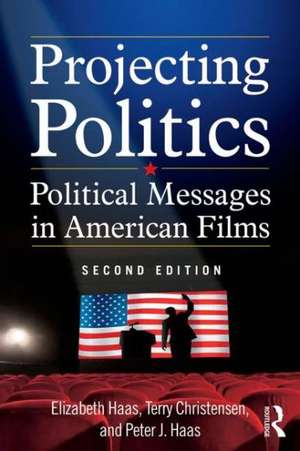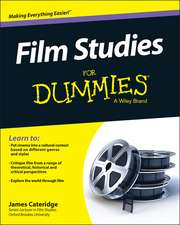Projecting Politics: Political Messages in American Films
Autor Elizabeth Haas, Terry Christensen, Peter J. Haasen Limba Engleză Paperback – 28 apr 2015
A companion website offers two additional appendices and further materials for those using the book in class.
| Toate formatele și edițiile | Preț | Express |
|---|---|---|
| Paperback (1) | 496.79 lei 6-8 săpt. | |
| Taylor & Francis – 28 apr 2015 | 496.79 lei 6-8 săpt. | |
| Hardback (1) | 1042.39 lei 3-5 săpt. | +37.26 lei 7-13 zile |
| Taylor & Francis – 20 apr 2015 | 1042.39 lei 3-5 săpt. | +37.26 lei 7-13 zile |
Preț: 496.79 lei
Nou
Puncte Express: 745
Preț estimativ în valută:
95.06€ • 99.25$ • 78.67£
95.06€ • 99.25$ • 78.67£
Carte tipărită la comandă
Livrare economică 04-18 aprilie
Preluare comenzi: 021 569.72.76
Specificații
ISBN-13: 9780765635976
ISBN-10: 0765635976
Pagini: 422
Ilustrații: 1 black & white tables
Dimensiuni: 178 x 254 x 23 mm
Greutate: 0.79 kg
Ediția:2 Rev ed.
Editura: Taylor & Francis
Colecția Routledge
Locul publicării:Oxford, United Kingdom
ISBN-10: 0765635976
Pagini: 422
Ilustrații: 1 black & white tables
Dimensiuni: 178 x 254 x 23 mm
Greutate: 0.79 kg
Ediția:2 Rev ed.
Editura: Taylor & Francis
Colecția Routledge
Locul publicării:Oxford, United Kingdom
Public țintă
Postgraduate and UndergraduateCuprins
I. Studying Political Films
1. Setting the Scene: A Theory of Film and Politics
2. The Making of a Message: Film Production and Techniques and Political Messages
3. Causes and Special Effects: The Political Environment of Film
II. Political Films by Decade
4. Politics in the Silent Movies
5. The 1930s: Political Movies and the Great Depression
6. The 1940s: Hollywood Goes to War
7. The 1950s: Anti-Communism and Conformity
8. The 1960s: From Mainstream to Counterculture
9. The 1970s: Cynicism, Paranoia, War and Anticapitalism
10. The 1980s: New Patriotism, Old Reds, and a Return to Vietnam in the Age of Reagan
11. The 1990s: FX Politics
12. The 2000s: 9/11 and Beyond
III. Political Films by Topic
13. True Lies? The Rise of Political Documentaries
14. Film and the Politics of Race: The Minority Report
15. Women, Politics, and Film: All About Eve?
16. White House Down? Politics in Disaster
Appendix
Closing Credits: A Political Filmography
1. Setting the Scene: A Theory of Film and Politics
2. The Making of a Message: Film Production and Techniques and Political Messages
3. Causes and Special Effects: The Political Environment of Film
II. Political Films by Decade
4. Politics in the Silent Movies
5. The 1930s: Political Movies and the Great Depression
6. The 1940s: Hollywood Goes to War
7. The 1950s: Anti-Communism and Conformity
8. The 1960s: From Mainstream to Counterculture
9. The 1970s: Cynicism, Paranoia, War and Anticapitalism
10. The 1980s: New Patriotism, Old Reds, and a Return to Vietnam in the Age of Reagan
11. The 1990s: FX Politics
12. The 2000s: 9/11 and Beyond
III. Political Films by Topic
13. True Lies? The Rise of Political Documentaries
14. Film and the Politics of Race: The Minority Report
15. Women, Politics, and Film: All About Eve?
16. White House Down? Politics in Disaster
Appendix
Closing Credits: A Political Filmography
Notă biografică
A recipient of a Woodrow Wilson Fellowship in the Humanities, Elizabeth Haas has published in numerous journals and teaches film studies at the University of Bridgeport in Connecticut.
The author of many books including Local Politics: Governing at the Grassroots, Terry Christensen is professor emeritus in the political science department at San Jose State University in California.
Peter J. Haas, recipient of a Fulbright Foundation Senior Specialist grant, is education director for the Mineta Transportation Institute and teaches political science at San Jose State University.
The author of many books including Local Politics: Governing at the Grassroots, Terry Christensen is professor emeritus in the political science department at San Jose State University in California.
Peter J. Haas, recipient of a Fulbright Foundation Senior Specialist grant, is education director for the Mineta Transportation Institute and teaches political science at San Jose State University.
Recenzii
"This well-researched, clearly-written, and informative view of politics and film will be appreciated by scholars and students alike. The aptly-titled Projecting Politics systematically surveys, decade by decade, the history of overt and covert political messages in American films from the silent era to the present day in refreshingly readable prose. Whether addressing explicit movies about Democrats and Republicans or subtextual sociopolitical issues such as race, gender, sexuality, and social class, the authors successfully merge political science and cinema studies in an engaging synthesis. Using an integrative cultural studies perspective, this volume also uncharacteristically (and significantly) offers a look at both the financial side and the artistic aspects of filmmaking that convey themes and ideological meaning in more subtle ways than obvious plot and dialogue. Thus, this volume could serve as a work of interdisciplinary scholarship, a course textbook, or just a great read. The revised and expanded second edition brings this all up to date, and with special attention to documentaries, cable-TV movies, and genre studies." —Frank P. Tomasulo, Pace University
"In a slowly expanding literature on film and politics, the substantially expanded second edition of Projecting Politicsfeatures among the very best monographs on the subject. The two new chapters complement the millennial filmography of this ‘problematic’ genre and along with updated chapters on the intersections of politics, race, and gender offer valuable and original insight to the closer relationship between film and politics in the 21st century. Projecting Politicsshould be included in every reading list of not only film and politics courses but also in media, and political science departments." —Betty Kaklamanidou, Aristotle University, Greece
"This text successfully delivers its message through the historical and contemporary analyses of films and the political messages they seek to convey. The newly revised edition provides a fresh and contemporary perspective on this fascinating subject." —Kenneth Christie, Royal Roads University
"In a slowly expanding literature on film and politics, the substantially expanded second edition of Projecting Politicsfeatures among the very best monographs on the subject. The two new chapters complement the millennial filmography of this ‘problematic’ genre and along with updated chapters on the intersections of politics, race, and gender offer valuable and original insight to the closer relationship between film and politics in the 21st century. Projecting Politicsshould be included in every reading list of not only film and politics courses but also in media, and political science departments." —Betty Kaklamanidou, Aristotle University, Greece
"This text successfully delivers its message through the historical and contemporary analyses of films and the political messages they seek to convey. The newly revised edition provides a fresh and contemporary perspective on this fascinating subject." —Kenneth Christie, Royal Roads University
Descriere
The new edition of this influential work updates and expands the scope of the original, including more sustained analyses of individual films, from The Birth of a Nation to The Wolf of Wall Street. An interdisciplinary exploration of the relationship between American politics and popular films of all kinds—including comedy, science fiction, melodrama, and action-adventure—Projecting Politics offers original approaches to determining the political contours of films, and to connecting cinematic language to political messaging. A new chapter covering 2000 to 2013 updates the decade-by-decade look at the Washington-Hollywood nexus, with special areas of focus including the post-9/11 increase in political films, the rise of political war films, and films about the 2008 economic recession. The new edition also considers recent developments such as the Citizens United Supreme Court decision, the controversy sparked by the film Zero Dark Thirty, newer generation actor-activists, and the effects of shifting industrial financing structures on political content. A new chapter addresses the resurgence of the disaster-apocalyptic film genre with particular attention paid to its themes of political nostalgia and the turn to global settings and audiences. Updated and expanded chapters on nonfiction film and advocacy documentaries, the politics of race and African-American film, and women and gender in political films round out this expansive, timely new work.
A companion website offers two additional appendices and further materials for those using the book in class.
A companion website offers two additional appendices and further materials for those using the book in class.











